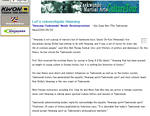'Hwarang=Taekwondo' Needs Reinterpretation
Seo Sung Won (The Taekwondo News)(2001/05/23)
"Hwarang is not a group of warriors but of handsome boys. Sesok Oh-Kye (Hwarang's five disciplines during Shilla) had nothing to do with Hwarang, and it was a set of norms for every day life of common people," said Shin Bok Ryong, Konkuk Univ. prof (History of politics and diplomacy). By this theory, he has stirred the Taekwondo society.
Prof. Shin reversed the existing theory by saying in Dong A Il Bo (daily), "Hwarang that has been praised as height of young culture in Korean history, but it is nothing but distortion of history."
His new theory give direct and indirect influences on Taekwondo as well as on the history society. Taekwondo history has generalized the equality 'Hwarang spirit=Taekwondo spirit' and most schools teach that Shilla's Hwarang is the very origin of Taekwondo.
Most Korean instructors including Kim Yong Ho and Moon Dae Won who are active in foreign countries never omit Hwarang in talking about spiritual culture (ethics and morals) of Taekwondo.
Taekwondo administrating bodies implicitly acknowledge the equality 'Hwarang spirit=Taekwondo spirit.' 「Kukkiwon, 25 years of history」published by Kukkiwon says, "It is desirable that today's Taekwondo men should accept Hwarang spirit as Taekwondo's philosophical mentality."
It was in mid-1970's when they studied history of sports that they related Hwarang to Taekwondo history. While prof. Na Hyun Sung and Jung Chan Mo formed a structure of Taekwondo history, they interpreted Korean history of martial arts as related with Taekwondo. Their interpretation is still dominant.
However, more and more people object to such interpretation in Taekwondo history. Starting a full-fledged talk about history and origin of Taekwondo, they even criticized that the previous description was a far-fetched reasoning.
Vice president of Kukkiwon Lee Jong Woo stressed the relation between Taekwondo and Hwarang to attain national pride and legitimacy, but later expressed that we needed a new perspective now. 'When they said that Hwarang spirit is Taekwondo spirit, they were only turning it to their own advantage.'
Prof. Yang Jin Bang (Yong In Univ. Dpt. Taekwondo) has a similar view.
Prof. Yang said, "I doubt if Taekwondo has fully accepted lots of studies of Hwarang. It is stupid to ask if Hwarang is the spirit of Taekwondo."
"It is problematic to interpret Hwarang as origin of Taekwondo," he continued. "It is necessary to investigate Hwarang spirit from a objective view and to accept it for Taekwondo."
By the way, prof. Oh Noh Gyun (Chung Cheong College) who has persistently studied the relation between Hwarang and Taekwondo said, "Interpretation depends on a view. We need to connect good things of Hwarang to Taekwondo, to make Taekwondo more constructive."
 The descriptions about Hwarang in Korean historical records are so limited.
The descriptions about Hwarang in Korean historical records are so limited.
Of course there is no TKD on the records since TKD is a modern martial art based on Karate.
And no mentioning about martial art and Hwarang.
The records say the boys were good at singing and dancing.
Yes Hwarang were mobilized for war but Hwarang weren't the only soldiers so they weren't something like specially trained troop.
PR
http://ninjer.blog.shinobi.jp/uriginal%20issue/-hwarang-taekwondo-%20needs%20reinterpretation'Hwarang=Taekwondo' Needs Reinterpretation

